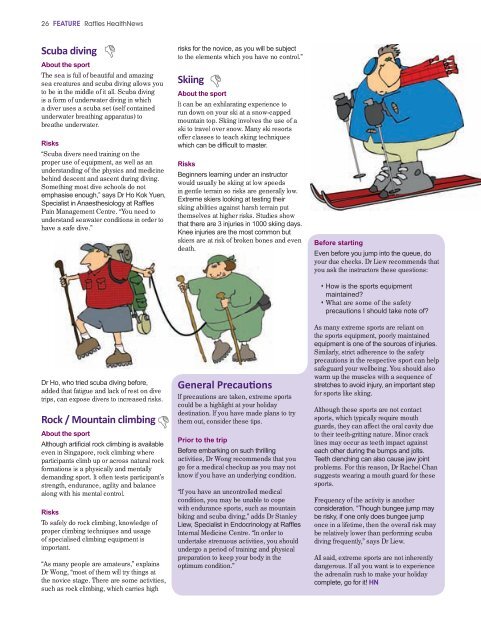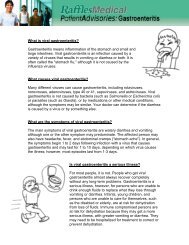REGISTRATION No. 198901967K MICA (P) - Raffles Medical Group
REGISTRATION No. 198901967K MICA (P) - Raffles Medical Group
REGISTRATION No. 198901967K MICA (P) - Raffles Medical Group
You also want an ePaper? Increase the reach of your titles
YUMPU automatically turns print PDFs into web optimized ePapers that Google loves.
26 Feature <strong>Raffles</strong> HealthNews<br />
Scuba diving<br />
About the sport<br />
The sea is full of beautiful and amazing<br />
sea creatures and scuba diving allows you<br />
to be in the middle of it all. Scuba diving<br />
is a form of underwater diving in which<br />
a diver uses a scuba set (self contained<br />
underwater breathing apparatus) to<br />
breathe underwater.<br />
Risks<br />
<br />
“Scuba divers need training on the<br />
proper use of equipment, as well as an<br />
understanding of the physics and medicine<br />
behind descent and ascent during diving.<br />
Something most dive schools do not<br />
emphasise enough,” says Dr Ho Kok Yuen,<br />
Specialist in Anaesthesiology at <strong>Raffles</strong><br />
Pain Management Centre. “You need to<br />
understand seawater conditions in order to<br />
have a safe dive.”<br />
Dr Ho, who tried scuba diving before,<br />
added that fatigue and lack of rest on dive<br />
trips, can expose divers to increased risks.<br />
Rock / Mountain climbing<br />
About the sport<br />
<br />
Although artificial rock climbing is available<br />
even in Singapore, rock climbing where<br />
participants climb up or across natural rock<br />
formations is a physically and mentally<br />
demanding sport. It often tests participant’s<br />
strength, endurance, agility and balance<br />
along with his mental control.<br />
Risks<br />
To safely do rock climbing, knowledge of<br />
proper climbing techniques and usage<br />
of specialised climbing equipment is<br />
important.<br />
“As many people are amateurs,” explains<br />
Dr Wong, “most of them will try things at<br />
the novice stage. There are some activities,<br />
such as rock climbing, which carries high<br />
risks for the novice, as you will be subject<br />
to the elements which you have no control.”<br />
Skiing<br />
About the sport<br />
It can be an exhilarating experience to<br />
run down on your ski at a snow-capped<br />
mountain top. Skiing involves the use of a<br />
ski to travel over snow. Many ski resorts<br />
offer classes to teach skiing techniques<br />
which can be difficult to master.<br />
Risks<br />
<br />
Beginners learning under an instructor<br />
would usually be skiing at low speeds<br />
in gentle terrain so risks are generally low.<br />
Extreme skiers looking at testing their<br />
skiing abilities against harsh terrain put<br />
themselves at higher risks. Studies show<br />
that there are 3 injuries in 1000 skiing days.<br />
Knee injuries are the most common but<br />
skiers are at risk of broken bones and even<br />
death.<br />
General Precautions<br />
If precautions are taken, extreme sports<br />
could be a highlight at your holiday<br />
destination. If you have made plans to try<br />
them out, consider these tips.<br />
Prior to the trip<br />
Before embarking on such thrilling<br />
activities, Dr Wong recommends that you<br />
go for a medical checkup as you may not<br />
know if you have an underlying condition.<br />
“If you have an uncontrolled medical<br />
condition, you may be unable to cope<br />
with endurance sports, such as mountain<br />
biking and scuba diving,” adds Dr Stanley<br />
Liew, Specialist in Endocrinology at <strong>Raffles</strong><br />
Internal Medicine Centre. “In order to<br />
undertake strenuous activities, you should<br />
undergo a period of training and physical<br />
preparation to keep your body in the<br />
optimum condition.”<br />
Before starting<br />
Even before you jump into the queue, do<br />
your due checks. Dr Liew recommends that<br />
you ask the instructors these questions:<br />
• How is the sports equipment<br />
maintained<br />
• What are some of the safety<br />
precautions I should take note of<br />
As many extreme sports are reliant on<br />
the sports equipment, poorly maintained<br />
equipment is one of the sources of injuries.<br />
Similarly, strict adherence to the safety<br />
precautions in the respective sport can help<br />
safeguard your wellbeing. You should also<br />
warm up the muscles with a sequence of<br />
stretches to avoid injury, an important step<br />
for sports like skiing.<br />
Although these sports are not contact<br />
sports, which typically require mouth<br />
guards, they can affect the oral cavity due<br />
to their teeth-gritting nature. Minor crack<br />
lines may occur as teeth impact against<br />
each other during the bumps and jolts.<br />
Teeth clenching can also cause jaw joint<br />
problems. For this reason, Dr Rachel Chan<br />
suggests wearing a mouth guard for these<br />
sports.<br />
Frequency of the activity is another<br />
consideration. “Though bungee jump may<br />
be risky, if one only does bungee jump<br />
once in a lifetime, then the overall risk may<br />
be relatively lower than performing scuba<br />
diving frequently,” says Dr Liew.<br />
All said, extreme sports are not inherently<br />
dangerous. If all you want is to experience<br />
the adrenalin rush to make your holiday<br />
complete, go for it! HN

















